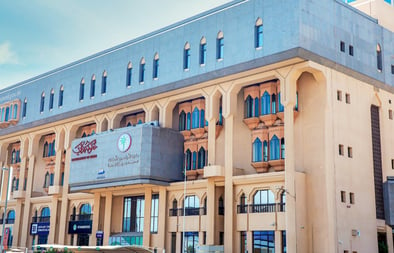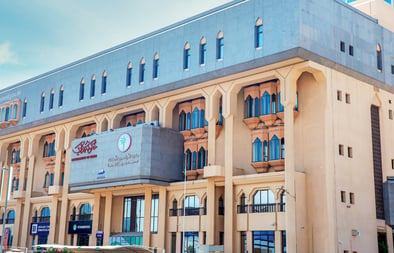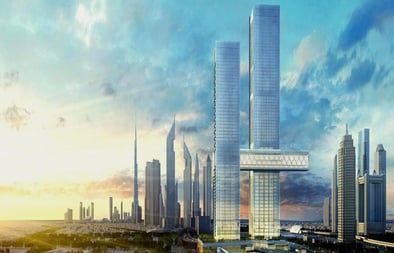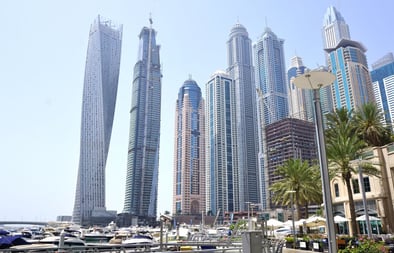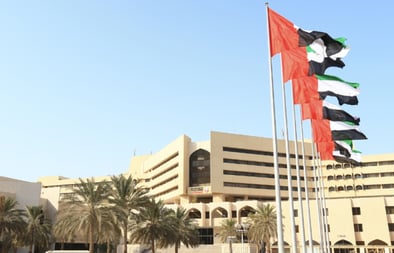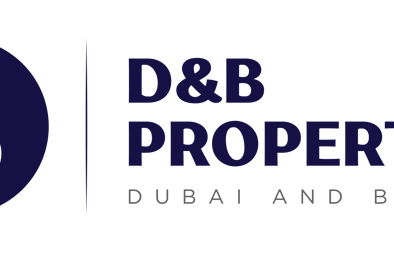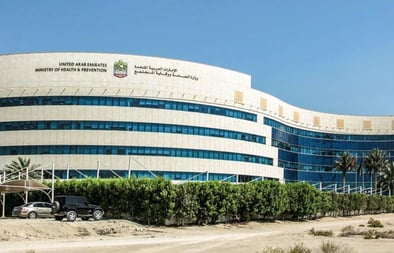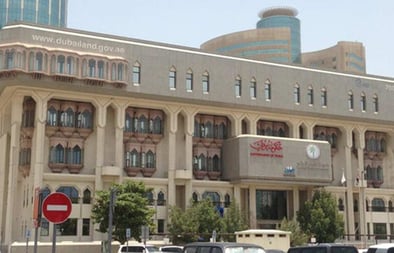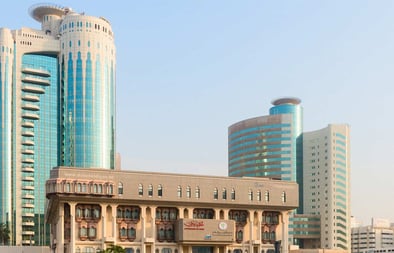
By Shabnam Bashiri
In recent years, Dubai's real estate industry has undergone an unprecedented digital transformation, revolutionizing the way properties are bought, sold, managed, and experienced.
As we explore the emerging trends shaping this transformation, we uncover a landscape adorned with predictive analytics, asset digitalization, IoT-powered workplace management, data analytics on market performance, and predictive analytics in asset performance.
1. Predictive Analytics: Shaping the Future of Real Estate Investments
Dubai's real estate industry has transcended traditional decision-making methods through the integration of predictive analytics. This transformative technology empowers professionals to leverage historical data, market trends, and demographic insights, accurately predicting future investment opportunities. By employing sophisticated algorithms, predictive analytics enables informed decisions, optimized portfolios, and risk mitigation. This adoption of data-driven strategies has attracted global investors to Dubai's real estate sector.
Predictive analytics in real estate investments offer several benefits. Firstly, investors can identify lucrative opportunities by analysing historical market trends, demographics, and economic indicators. They can assess risk profiles and predict market performance, allowing them to make informed investment decisions. This data-driven approach helps investors optimize their portfolios, allocate resources efficiently, and reduce potential risks.
Moreover, developers can leverage predictive analytics to align their projects with market demands. By analysing data on customer preferences, buying patterns, and market trends, developers can design properties that meet the specific needs of their target audience. This ensures higher occupancy rates and increased profitability for developers.
Furthermore, predictive analytics enables stakeholders to forecast property values and rental yields accurately. By analysing historical and real-time data, investors and developers can make informed decisions regarding property acquisitions, pricing strategies, and rental projections. This information enhances their ability to identify investment opportunities that align with their financial goals and long-term strategies.
2. Asset Digitalization: Revolutionizing Property Management & Ownership

Asset digitalization has emerged as a game-changer in Dubai's real estate industry. Property owners and managers increasingly adopt cutting-edge technologies to digitize property portfolios, streamlining processes, and enhancing operational efficiency. Virtual property tours enable potential buyers to explore properties remotely, surpassing geographical barriers and saving time. Digital property management platforms centralize data, automate workflows, and provide real-time insights, empowering property owners and tenants alike.
The digitalization of property assets offers several advantages. Firstly, virtual property tours allow potential buyers to experience properties from the comfort of their own homes. High-quality 3D visuals, virtual reality, and augmented reality technologies provide immersive experiences, enabling buyers to assess properties' features, layouts, and amenities without the need for physical visits. This not only saves time and resources but also attracts international buyers who can explore properties remotely.
Secondly, digitalization enhances property management practices. By centralizing property data on digital platforms, property owners and managers can efficiently manage multiple properties, streamline processes, and enhance operational transparency. Digital platforms offer functionalities such as automated rental collection, maintenance ticketing systems, and communication channels between owners, tenants, and service providers. This digitized approach improves efficiency, reduces administrative burden, and ensures a seamless property management experience for all stakeholders.
Moreover, asset digitalization facilitates data-driven decision-making in property management. By collecting and analysing data on tenant preferences, rental trends, and maintenance requirements, property owners can optimize their services and improve tenant satisfaction. They can identify areas for improvement, make informed decisions about property upgrades and maintenance, and personalize their offerings based on tenant needs.
3. IoT in Workplace Management: Transforming Offices
Dubai's business landscape integrates the Internet of Things (IoT) into workplace management, fostering dynamic and intelligent office environments. IoT-powered sensors collect real-time data on space utilization, air quality, energy consumption, and employee well-being, facilitating informed decision-making and optimized resource allocation. Smart offices equipped with IoT devices ensure comfort, safety, and sustainability, attracting businesses seeking innovative workspaces.
The integration of IoT technology in workplace management brings numerous benefits to Dubai's real estate industry. Firstly, IoT sensors and devices collect real-time data on various aspects of office spaces, including occupancy levels, temperature, lighting, and air quality. This data allows businesses to optimize resource allocation, improve energy efficiency, and create more comfortable working environments. By analysing occupancy patterns, businesses can identify underutilized spaces and make informed decisions regarding space optimization and allocation, leading to cost savings and increased productivity.

Furthermore, IoT-powered smart offices enhance safety and security measures. Connected security systems, access control, and surveillance cameras equipped with IoT devices provide real-time monitoring and alerts. This ensures a secure working environment for employees and protects valuable assets within office premises.
IoT technology also enables the implementation of smart building systems that automatically adjust environmental conditions based on occupancy and employee preferences. This includes features such as intelligent lighting systems that adjust brightness based on natural light and occupancy, smart thermostats that optimize temperature settings, and automated blinds or curtains that adapt to external lighting conditions. These features not only enhance employee comfort but also contribute to energy conservation and sustainability efforts.
Moreover, IoT devices can monitor employee well-being by collecting data on factors such as air quality, temperature, humidity, and noise levels. This data can be used to identify areas for improvement and create healthier and more productive work environments. For example, if the air quality is compromised, IoT sensors can trigger alerts and prompt the HVAC system to adjust ventilation settings, accordingly, ensuring a healthier indoor environment.
4. Data Analytics on Market Performance: Driving Informed Decision-Making
The availability of advanced data analytics tools in Dubai significantly enhances real estate market intelligence. These tools collect and analyse vast amounts of data, empowering stakeholders to monitor market performance, identify emerging trends, and understand customer preferences. With actionable insights derived from analytics platforms, developers can align their projects with market demands, design targeted marketing campaigns, and optimize pricing strategies. Buyers and investors gain access to comprehensive market data, facilitating informed decisions and driving transparency within the industry.
Data analytics tools provide a wealth of information to real estate stakeholders. By analysing market trends, transaction data, and economic indicators, developers can identify areas of opportunity and assess the viability of new projects. They can evaluate factors such as demand-supply dynamics, population growth, infrastructure development, and economic forecasts to make informed decisions about project location, size, and scope.
Furthermore, data analytics enables developers to customize their marketing strategies and target specific customer segments. By analysing demographic data, buyer preferences, and online behaviour, developers can tailor their marketing campaigns to resonate with their target audience. This leads to more effective marketing efforts, increased customer engagement, and higher conversion rates.
For buyers and investors, access to comprehensive market data is invaluable. Data analytics platforms provide real-time information on property prices, rental yields, market trends, and inventory levels. This empowers buyers to make informed decisions about property purchases, evaluate investment opportunities, and negotiate effectively. Investors can monitor market performance, identify emerging trends, and assess the potential return on investment for different properties or locations.
Moreover, data analytics facilitates transparency within the real estate industry. By providing accurate and up-to-date market information, it reduces information asymmetry and enhances trust between buyers, sellers, and investors. This transparency fosters a more efficient and competitive marketplace, benefiting all stakeholders.
5. Predictive Analytics in Asset Performance: Unlocking Value and Efficiency
Predictive analytics not only transform investment strategies but also revolutionize asset management in Dubai's real estate sector. By leveraging historical and real-time data, property owners can predict maintenance requirements, optimize energy consumption, and ensure asset longevity. This data-driven approach minimizes downtime, maximizes operational efficiency, and reduces costs, creating sustainable and future-ready properties. Predictive analytics plays a crucial role in unlocking value and efficiency in asset performance management.
One of the key benefits of predictive analytics in asset performance management is the ability to predict maintenance needs and optimize maintenance schedules. By analysing historical data on equipment performance, maintenance records, and environmental factors, property owners can identify patterns and indicators that signal potential issues. This allows them to take proactive measures to prevent breakdowns and minimize downtime. Predictive maintenance not only reduces repair costs but also improves operational efficiency by avoiding unplanned disruptions and maximizing the lifespan of assets.
Another area where predictive analytics adds value is in optimizing energy consumption. By analyzing data on energy usage patterns, weather conditions, and occupancy levels, property owners can identify opportunities for energy efficiency improvements. Predictive analytics can help determine the most energy-intensive areas of a property and provide recommendations for optimizing energy usage through equipment upgrades, system optimizations, and behavioural changes. This not only reduces operational costs but also contributes to sustainability efforts by minimizing environmental impact.
Furthermore, predictive analytics enables property owners to forecast asset performance and plan. By analysing historical data and market trends, property owners can gain insights into factors that affect asset value, such as location dynamics, market demand, and infrastructure developments. This information helps them make informed decisions about potential renovations, upgrades, or expansions that can enhance asset value and generate higher returns.
In addition, predictive analytics can assist property owners in optimizing their financial strategies. By analysing historical rental data, market trends, and economic indicators, property owners can predict rental demand, vacancy rates, and rental rates. This enables them to develop pricing strategies that maximize occupancy rates and rental income while remaining competitive in the market. Predictive analytics also helps property owners identify opportunities for portfolio diversification, identify emerging markets, and make data-driven investment decisions.
What We Can Take Away

The digital transformation of Dubai's real estate industry is being driven by several emerging trends. Predictive analytics, asset digitalization, IoT in workplace management, data analytics on market performance, and predictive analytics in asset performance are reshaping the industry landscape, making it more efficient, transparent, and customer centric. These trends bring numerous benefits to stakeholders in Dubai's real estate industry.
By capitalizing on predictive analytics, investors and developers can make data-driven decisions, optimize portfolios, and mitigate risks. Asset digitalization streamlines property management processes, enhances transparency, and improves tenant experiences. IoT-powered workplace management fosters intelligent office environments, promoting productivity, sustainability, and employee well-being. Data analytics on market performance provides valuable insights for informed decision-making, while predictive analytics in asset performance unlocks value and efficiency.
Dubai's commitment to embracing innovation and technology has positioned the city as a global leader in the real estate sector. By embracing these emerging trends, stakeholders can unlock unprecedented opportunities, foster sustainable practices, and pave the way for a prosperous future in Dubai's real estate industry. As the digital revolution continues to reshape the industry, it is essential for real estate professionals in Dubai to stay at the forefront of these digitalization trends to remain competitive and meet the evolving needs of investors, developers, tenants, and buyers.



























.jpg)















